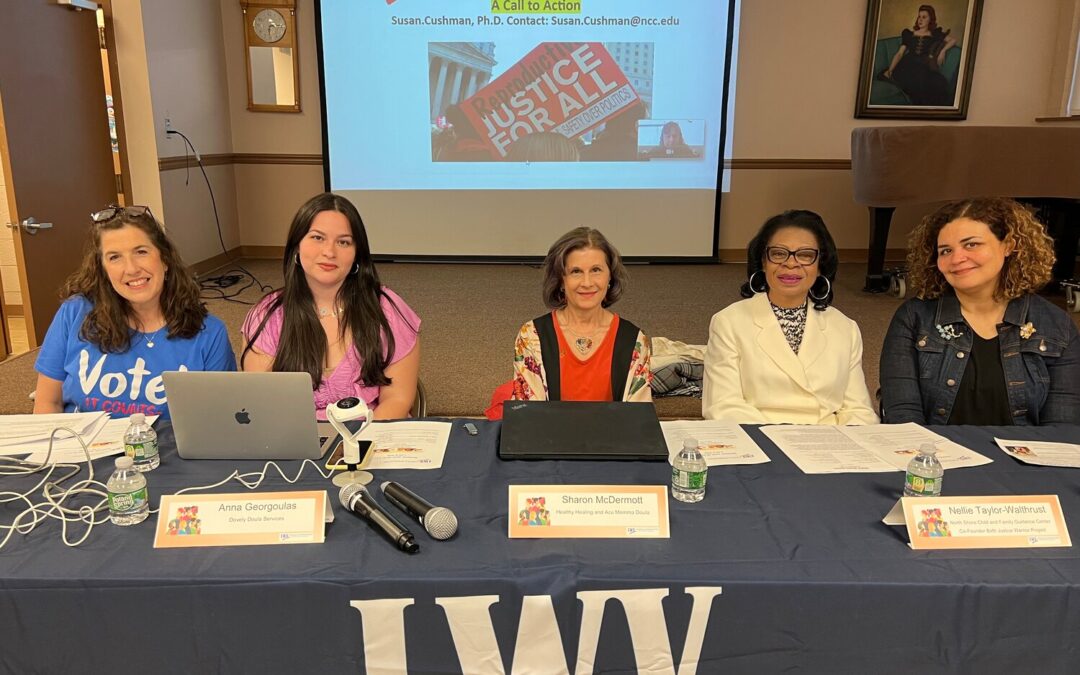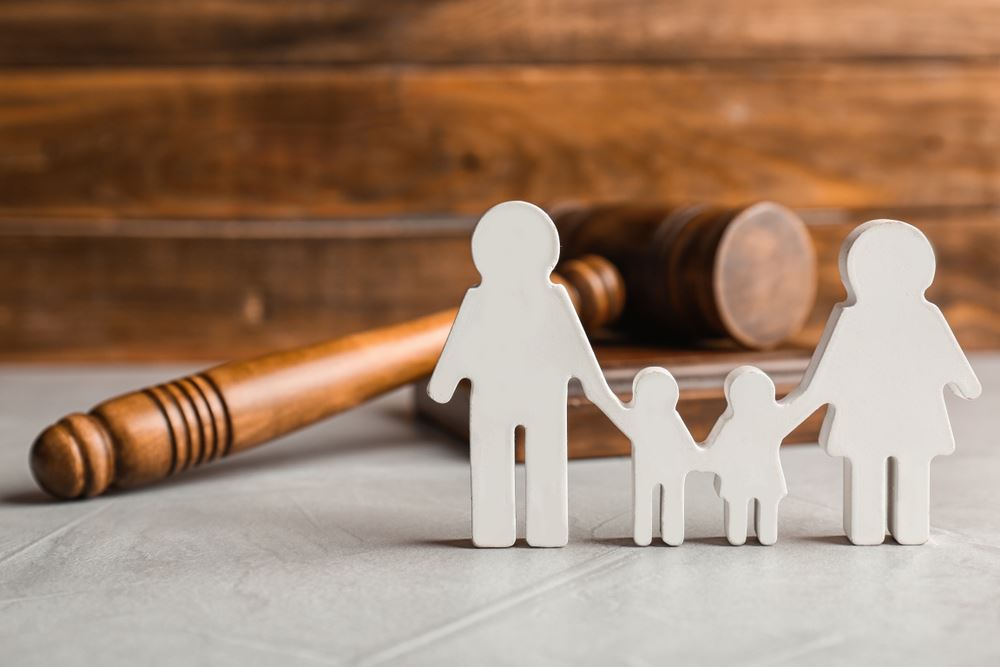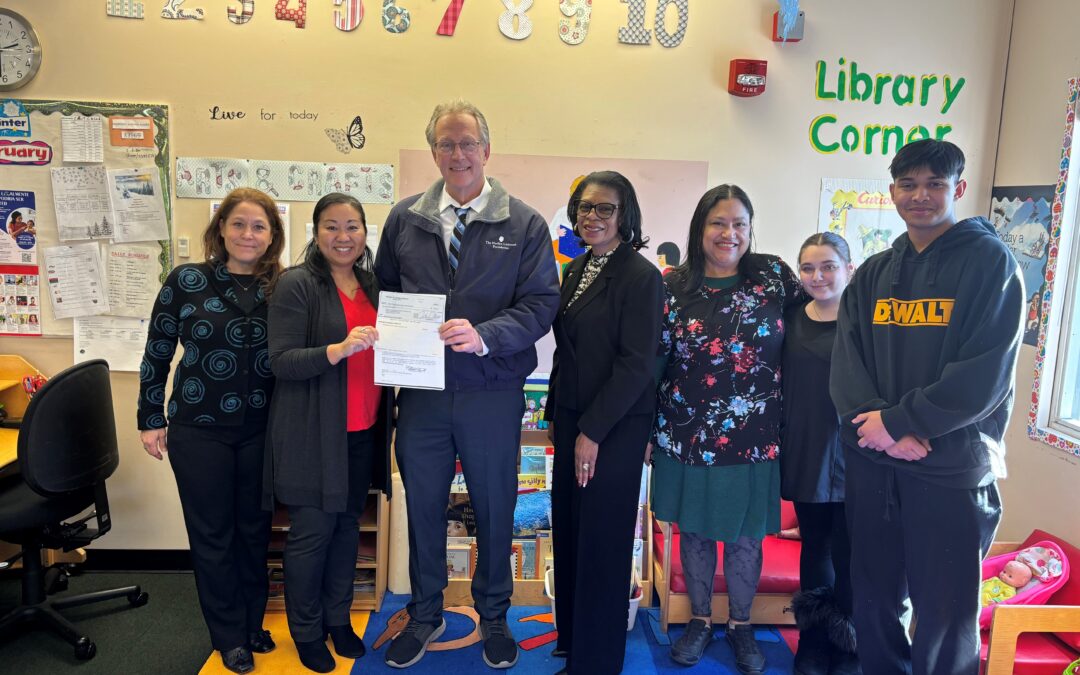
by North Shore Child & Family Guidance Center | Mar 28, 2024 | In The Media, LI Herald
The Freeport Memorial Library hosted a detailed, lively panel discussion last Friday, connecting women’s reproductive rights to the New York State Equal Rights Amendment.
The program was organized by the League of Women Voters of Central Nassau.
On Nov. 5, voters will have an opportunity to enshrine a revised version of the state amendment in law, by approving it in the voting booth.
New York currently has an Equal Rights Amendment that prohibits discrimination based on race, color, creed or religion. The revised amendment adds more protected categories: ethnicity, national origin, age, disability and sex.
The category of sex is broken down into “sexual orientation, gender identity, gender expression, pregnancy, pregnancy outcomes, and reproductive health care and autonomy.”
Abortion access may be the issue that most readily comes to mind under the heading “reproductive health care,” but it is not the only concern for women.
Nondiscriminatory treatment before, during and after pregnancy is not uniformly protected throughout the state, nor is government support for children’s health consistent statewide, the panelists said.
Susan Cushman, an English professor at Nassau Community College, defined “reproductive justice” by referring to Loretta Ross, a professor of women and gender studies at Smith College.
Ross named three tenets of reproductive justice: the right not to have a child, which involves abortion access; the right to have as many childrenas a woman may want; and the right to raise children in a healthy environment.
“We need a state constitution that protects your rights and my rights to have the bodily care that we deserve as a basic right,” Cushman said. She referenced a lawsuit, Zurawski v. State of Texas, in which 23 women are suing Texas because they could not obtain abortions that their doctors deemed medically necessary.
Anna Georgoulas, founder of Dovely Doula Services, explained that doulas — non-medical professionals who provide emotional, physical and informational support to new and expectant parents — help fight the high infant and maternal mortality rate in the United States. They help clients create birth plans and train women to advocate for themselves throughout pregnancy, birth and postpartum life. Doulas are “an information hub” for women, Georgoulas said.
Sharon McDermott, a doula whose business is called Healthy Healing, said that New York has instituted ways for birth doula providers to be paid through Medicaid, which increases equitable access for women lacking insurance.
Martine Hackett, an associate professor of health at Hofstra University, related the history of Birth Justice Warriors, which she co-founded with Dr. Nellie Taylor-Walthrust in 2018. Hempstead attorney Frederick K. Brewington lent support by framing the excessive mortality rates among women and infants of color in Nassau County as a civil rights issue.
Pre-existing conditions, like hypertension, are common causes of maternal death, Hackett explained, but a leading cause of infant mortality is stress on the mother during pregnancy.
“We do peer-to-peer education,” Hackett said. “We work with other clinicians, and partner with major health organizations such as Northwell Health to increase health care access.”
“What is happening in Nassau County drove us to action,” Taylor-Walthrust said. “Roosevelt has the highest numbers for infant mortality and low birthweight babies, with Hempstead being number 2 and number 3 being Westbury. We make sure that mother and baby have as healthy an environment as they can, and we teach them that they have a right to ask questions. We educate the hospital doctors and nurses and social workers to treat the mothers with respect.”
Birth Justice Workers has instigated change at the local, state and federal levels. “Women’s maternal health is now being recognized throughout New York state, and in particular in Nassau County, because of the work that Martine and I would not give up on,” Taylor-Walthrust said.
Cushman closed the program by urging voter support for the state Equal Rights Amendment. “For the first time, we are putting reproductive health squarely in the broader framework of protecting all of our rights and freedoms,” she said. “Our coalition is made up of registered Democrats, registered Republicans and independent voters. This is a pan-partisan initiative.”
Deputy Town Supervisor Dorothy Goosby, a member of the League of Women Voters, visited the program and urged attendees to join the organization.
“We need women like you to be involved,” Goosby said, “because it’s the only way we’re going to get things done.
Photo: Panelists at the League of Women Voters of Central Nassau event, hosted by the Freeport Memorial Library last Friday, discussed women’s issues and the state Equal Rights Amendment. From left were Susan Cushman, Anna Georgoulas, Sharon McDermott, Dr. Nellie Taylor-Walthrust, a co-founder of the Birth Justice Warrior Project, and Martine Hackett, an associate professor of health at Hofstra University.
Photo Credit: Courtesy Reine Bethany

by North Shore Child & Family Guidance Center | Mar 22, 2024 | Blog
By Dr. Nellie Taylor-Walthrust
Family court proceedings can have a profound and lasting impact on children, often resulting in emotional and psychological trauma. The adversarial nature of family court, where parents may be pitted against each other in legal battles, can create an environment of stress, uncertainty, and instability for children. As many parents do not have the luxury of leaving their children at home during these disputes, North Shore Child and Family Guidance Center has committed to protecting the children of our community from the long-lasting impact caused by family court.
Why should kids be kept out of court?
While children often do not have the language to make sense of what is happening inside a courtroom, they are highly attuned to the emotions of adults and can pick up on the tension brewing between their parents. Consistent exposure to conflict can weaken a child’s sense of security and contribute to feelings of powerlessness and vulnerability. When left unaddressed, these emotions spiral into depression, anxiety, and insecurities that often follow into adulthood.
Children caught in the midst of their guardians’ legal battle may feel their relationship begin to strain. One of the primary challenges that can arise is the pressure to choose sides, which can emerge from parental expectations, subtle cues, or observed dynamics in the courtroom. It is important to shield kids from these expectations, as picking a side can result in feelings of guilt and abandonment towards the other parent.
As children bear witness to their family undergoing irreparable changes, they often feel a sense of responsibility for the separation. In trying to make sense of the shift in their family, kids frequently end up believing that they are the cause of their parents’ unhappiness. This is especially true in hearings pertaining to custody and child support when the child is the main topic of conversation.
The Children’s Center
The Children’s Center at Nassau County Family Court is operated by North Shore Child and Family Guidance Center. It is a place of respite for children whose families have business in court. Far from a simple babysitting service, the Children’s Center is an early-learning environment that fosters developmental skills through age-appropriate play, activities, and free books for the children to take home. Every aspect of the Children’s Center is designed with kids in mind, allowing them to explore new things in a structured, professionally supervised way. Though they may face uncertainty at home, we are proud to say that the Children’s Center provides a place for kids to be happy, carefree, and most importantly, safe.
To learn more about volunteering at the Children’s Center, contact Dr. Nellie Taylor-Walthrust, Director at North Shore Child & Family Guidance Center’s Leeds Place and head of the Children’s Center, at 516-997-2926, ext. 229, or email ntaylorwalthrust@northshorechildguidance.org.

by North Shore Child & Family Guidance Center | Mar 15, 2024 | Anton Media, Blank Slate Media, In The Media, Long Island Business News, Press Releases
North Shore Child & Family Guidance Center, Long Island’s leading not-for-profit children’s mental health center, is honored to announce that The Marilyn Lichtman Foundation has donated $10,000 towards supporting the Children’s Center at Nassau County Family Court.
The Children’s Center at Nassau Family Court is a program of North Shore Child and Family Guidance Center that offers a place of respite for children whose families have business in court. More than a babysitting service, the Children’s Center is an early-learning environment that fosters developmental skills through age-appropriate play, activities, and free books for the children to take home. Every aspect of the Children’s Center is designed with kids in mind, allowing them to explore new things in a structured, professionally supervised way.
“Many of the organizations we support involve children in many different situations,” said Robert Brull, President of the Marilyn Lichtman Foundation. “As a former investigator, I’ve seen what trauma can fall upon children from court cases, especially cases involving divorce and/or child abuse. Giving a child the ability to feel safe and comfortable while parents or guardians go through the court’s justice system is a positive step in reducing emotional damage to the child.”
Dr. Nellie Taylor-Walthrust, Director of the Leeds Place — Serving Young People, expressed immense gratitude towards the Marilyn Lichtman Foundation’s generous donation. “Our goal at the Children’s Center is to keep kids out of the courtroom and provide a safe place for them to grow,” said Dr. Taylor-Walthrust. “The Center is free for any family with business at Nassau County Family Court, so this grant will allow us to continue and expand upon this important program. Thank you to Robert and the Marilyn Lichtman Foundation for caring about our children.”
The Marilyn Lichtman Foundation honors the legacy of Marilyn Lichtman through philanthropic contributions to those in need throughout our community, hoping to enhance the lives of future generations.
For more information on the Marilyn Lichtman Foundation, visit marilynlichtmanfoundation.org. To learn more about the Guidance Center, visit www.northshorechildguidance.org or call 516-626-1971.
Pictured: Lauren McGowan, Kathy Rivera, Robert Brull, Dr. Nellie Taylor-Walthrust, Monica Dolley, and volunteers Ashley Gentiluomo & Alex Breslin
Published in Anton Media, click to view, Blank Slate, click to view, and Long Island Business News, click to view.

by North Shore Child & Family Guidance Center | Mar 8, 2024 | Blog
By Guest Blogger Michelle Quill, Photo by Wes Hicks on Unsplash
The importance of mental well-being during pregnancy
Pregnancy is a time of immense physical and emotional changes for women. As the body prepares to bring new life into the world, it is crucial to prioritize mental well-being alongside physical health. Mental health during pregnancy can have a significant impact on both the mother and the developing baby. Research has shown that stress, anxiety, and depression during pregnancy can lead to adverse outcomes such as preterm birth, low birth weight, and developmental difficulties. Therefore, it is essential for first-time moms to take proactive steps to maintain their mental well-being throughout this transformative journey.
Common mental health challenges during pregnancy
First-time moms may experience a range of mental health challenges during pregnancy. Hormonal fluctuations, physical discomfort, and the anticipation of becoming a mother can contribute to increased stress and anxiety levels. It is common for expectant mothers to feel overwhelmed, uncertain, or even fearful about the changes that lie ahead. Additionally, women with a history of mental health conditions, such as depression or anxiety, may be more susceptible to experiencing these challenges during pregnancy. Recognizing the common mental health challenges that first-time moms face is the first step towards addressing them effectively.
Understanding the hormonal changes during pregnancy and their impact on mental health
During pregnancy, the body undergoes significant hormonal changes that can affect mental well-being. The levels of estrogen and progesterone, two key hormones in pregnancy, increase dramatically. These hormonal fluctuations can impact neurotransmitters in the brain, such as serotonin and dopamine, which play a crucial role in regulating mood. As a result, some women may experience mood swings, irritability, or feelings of sadness. It is important for first-time moms to understand that these changes are normal and temporary. By recognizing the influence of hormonal changes on mental health, expectant mothers can better navigate their emotional well-being.
Tips for managing stress and anxiety during pregnancy
Managing stress and anxiety is vital for maintaining mental well-being during pregnancy. Here are some tips to help first-time moms cope with these challenges:
- Practice relaxation techniques: Engaging in activities such as deep breathing exercises, meditation, or prenatal yoga can promote relaxation and reduce stress levels.
- Maintain a healthy lifestyle: Eating a balanced diet, getting regular exercise, and getting enough sleep can contribute to overall well-being and help manage stress.
- Seek support from loved ones: Sharing your feelings and concerns with trusted family members or friends can provide emotional support and help alleviate anxiety.
- Educate yourself: Learning about pregnancy, childbirth, and parenting can help reduce fear and anxiety by providing a sense of preparedness.
- Stay organized: Creating a schedule, making to-do lists, and preparing for the arrival of the baby can help reduce feelings of overwhelm and increase a sense of control.
By incorporating these strategies into their daily routine, first-time moms can effectively manage stress and anxiety, promoting a positive mental state during pregnancy.
The role of self-care in maintaining mental well-being
Self-care is crucial for maintaining mental well-being during pregnancy. Taking time for oneself allows expectant mothers to recharge, relax, and focus on their own needs. Here are some self-care practices that first-time moms can incorporate into their routine:
- Prioritize rest and relaxation: Getting enough sleep, taking naps, and indulging in activities that promote relaxation, such as reading or taking baths, can help reduce stress levels.
- Engage in activities you enjoy: Pursuing hobbies, spending time in nature, or engaging in creative outlets can provide a sense of joy and fulfillment, promoting positive mental well-being.
- Practice self-compassion: Acknowledge and accept your emotions, treating yourself with kindness and understanding. Remember that it is normal to have ups and downs during pregnancy.
- Nurture your body: Taking care of physical health, such as eating nutritious meals, staying hydrated, and engaging in gentle exercise, can contribute to a sense of well-being.
By making self-care a priority, first-time moms can better navigate the emotional rollercoaster of pregnancy and promote their mental well-being.
Building a support network during pregnancy
Building a support network is crucial for expectant mothers, especially first-time moms. Having a strong support system can provide emotional reassurance, practical assistance, and a sense of belonging. Here are some ways to build a support network during pregnancy:
- Connect with other expectant mothers: Joining prenatal classes or support groups allows first-time moms to connect with others who are going through similar experiences.
- Reach out to family and friends: Share your thoughts, concerns, and joys with loved ones. They can offer advice, lend a helping hand, or simply be there to listen.
- Consider professional support: Seeking guidance from healthcare providers, such as obstetricians, midwives, or therapists, can provide expert advice and support throughout the pregnancy journey.
By surrounding themselves with a supportive community, first-time moms can feel more confident, validated, and emotionally strong during their pregnancy.
Seeking professional help for mental health issues during pregnancy
If first-time moms are experiencing persistent or severe mental health challenges during pregnancy, seeking professional help is essential. Mental health issues, such as depression or anxiety, should not be ignored or underestimated. Healthcare providers can offer appropriate interventions and support, tailored to the specific needs of expectant mothers. Therapeutic interventions, such as cognitive-behavioral therapy or medication, may be recommended depending on the severity of the mental health condition. Seeking professional help is a proactive step towards ensuring the well-being of both the mother and the baby.
Preparing for the emotional transition into motherhood
Transitioning into motherhood can be emotionally overwhelming for first-time moms. It is important to acknowledge and prepare for the emotional changes that come with becoming a mother. Here are some tips to help navigate this transition:
- Educate yourself: Read books or attend classes about the emotional aspects of motherhood. Understanding the emotional journey can help normalize the experience and reduce anxiety.
- Communicate with your partner: Share your expectations, fears, and hopes with your partner. Open and honest communication can strengthen the bond and provide emotional support.
- Seek guidance from experienced mothers: Connect with mothers who have been through the same experience. Their wisdom and advice can provide reassurance and guidance.
By acknowledging and preparing for the emotional transition into motherhood, first-time moms can navigate this phase with greater ease and confidence.
Postpartum mental health and the importance of ongoing support
The postpartum period is another critical time for mental health. Many women experience the “baby blues,” which include mood swings, tearfulness, and feelings of vulnerability, in the days following childbirth. However, some women may develop more severe mental health conditions, such as postpartum depression or anxiety. It is crucial for first-time moms to be aware of the signs and symptoms and seek support if needed. Ongoing support from healthcare providers, family, and friends is essential in promoting postpartum mental well-being.
Conclusion
Maintaining mental well-being during pregnancy is vital for the overall health and happiness of both expectant mothers and their babies. By understanding the common mental health challenges, managing stress and anxiety, practicing self-care, building a support network, seeking professional help if needed, and preparing for the emotional transition into motherhood, first-time moms can navigate this transformative journey with confidence and resilience. Remember, prioritizing mental well-being is not selfish but a necessary step towards ensuring a healthy and joyful pregnancy.

by North Shore Child & Family Guidance Center | Feb 22, 2024 | Blog
By Guest Blogger Dr. Hannah Yang
The teen years are not devoid of any challenges, but the barriers that modern adolescent girls face are very different from the ones faced by previous generations.
The rapid advancement of technology and social media expansion, though advantageous in various aspects, introduces new challenges. It’s imperative that young women develop a solid network of support and find proper coping mechanisms for addressing these new roadblocks in their lives.
Resilience and a positive perspective need to be developed at an early stage for them to form the foundation for a happy, healthy future.
Common Challenges on the Path to Adulthood for Adolescent Girls
In their transition to adulthood, young girls come across many challenges that are vital to their personal growth. Although each teen girl’s journey is unique, a considerable number share similar obstacles during this important transformative phase.
Dealing with Social Media and Other Pressures
Staying in touch with friends and family is crucial, and social media has facilitated this, especially over long distances. But there’s a catch to this constant connectivity.
Teen girls frequently face the challenge of upholding a certain image online, influenced by young celebrities and influencers, and the urge to match their peers. This can negatively affect their self-esteem and distort their self-image.
Coping with Academic Pressure from Peers and Family
Education is vital for the development of various life skills. However, the stress to excel in academics, often stemming from family and peer expectations, can be overwhelming. Comparing themselves to friends, parents, or siblings can feel like an uphill battle.
If left unaddressed, this added stress can adversely affect a young girl’s self-esteem, particularly if her achievements don’t meet these high expectations. It’s important for them to recognize that academic performance is not the only measure of intelligence or self-worth.
Feeling the Pressure to Conform
Despite the current generation often being seen as advocates for uniqueness and individualism, the pressure to conform remains a significant issue for many teenage girls. Fitting in with a group can offer a sense of security and belonging, which is an important aspect of social development.
But this urge to blend in can lead girls to compromise their principles and values. This might take the form of drastically altering their appearance or adopting harmful habits to gain acceptance within certain social circles.
The Importance of Resilience in Navigating Teenage Challenges
Teen girls often depend on their network of friends and family for support, which provides a strong base. However, the real tests often arise when they’re alone. This situation highlights the need for resilience.
Resilience involves more than just recovery – it’s about gaining insight from new challenges and applying this knowledge to reinforce personal character and resolve.
Overcoming Adversity
During their teenage years, young girls face various trials, from coping with rejection and failures to enduring traumatic events. Without effective strategies to manage these situations, they can leave lasting impacts, shaping a young woman’s self-esteem and future relationships.
Building resilience, possibly with the help of family or professional support, equips teens with the necessary tools to confront these challenges and grow stronger from them.
Learning From Setbacks
Resilience can be illustrated with the famous phrase, “When life hands you lemons, make lemonade.” This technique allows you to find opportunities for learning from challenges experienced and use them for personal development.
The process of gaining insights from tough experiences can be something more than one person experiences. Teaming up with a mentor, joining support circles, or seeking advice from mental health experts in dealing with anxiety or trauma therapy can provide clinical perspectives and much-needed support through difficult times.
Encouraging Thoughtful Decision Making
As adolescents, the feeling of invincibility and a belief in having all the answers is a natural phase. However, this attitude, combined with inexperience, often results in teens making hasty choices with lasting effects.
Building resilience is important in this regard, as it promotes proactive thinking instead of reactionary decision-making. Adolescents learning resilience are more likely to think about the long-term ramifications of their actions, weighing benefits and drawbacks thoughtfully, helping them to make smarter choices.
Develop Better Resilience Today
Cultivating resilience is a continuous process, not a one-time achievement. It requires consistent effort and commitment to establish this quality in individuals. The rewards, however, can be immense and lead to better coping mechanisms, increased self-awareness, and improved relationships.
 Author Name: Dr. Hannah Yang
Author Name: Dr. Hannah Yang
Author Bio: Visionary and healthcare entrepreneur by passion, Licensed Psychologist by training, Dr. Hannah Yang loves creating new possibilities in the world of mental health and wellness. Dr. Yang established Balanced Awakening in 2015 as a niche psychotherapy practice for women. As Balanced Awakening flourishes in Chicago, and soon Miami, she also loves to tap into her passion for design and Feng Shui to create fabulous environments for herself, her team, and clients.






 Author Name: Dr. Hannah Yang
Author Name: Dr. Hannah Yang